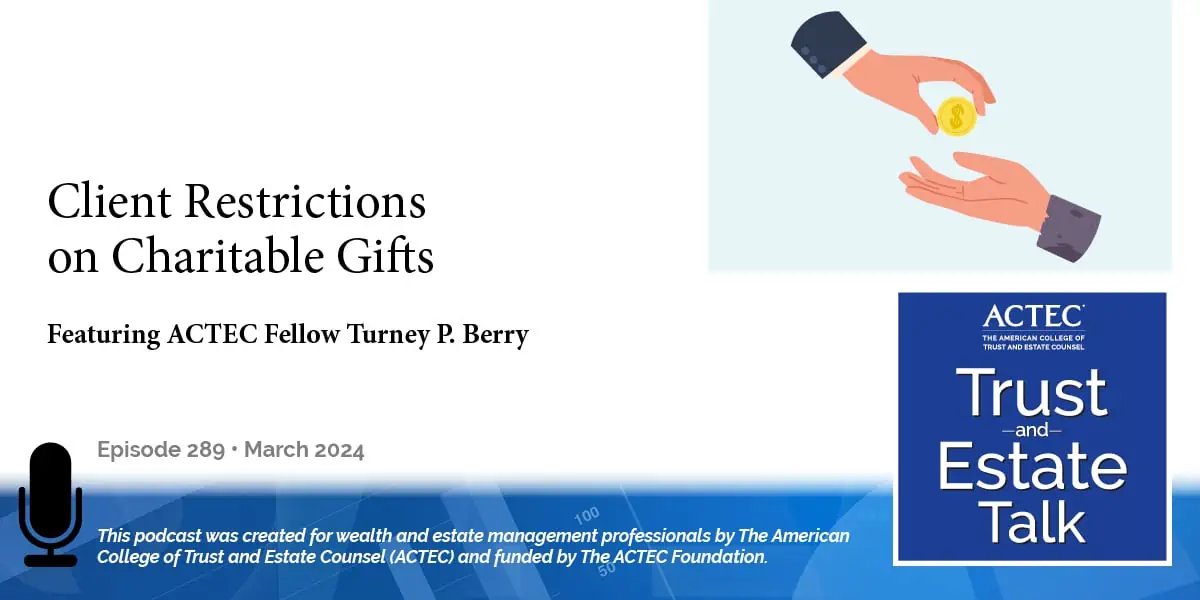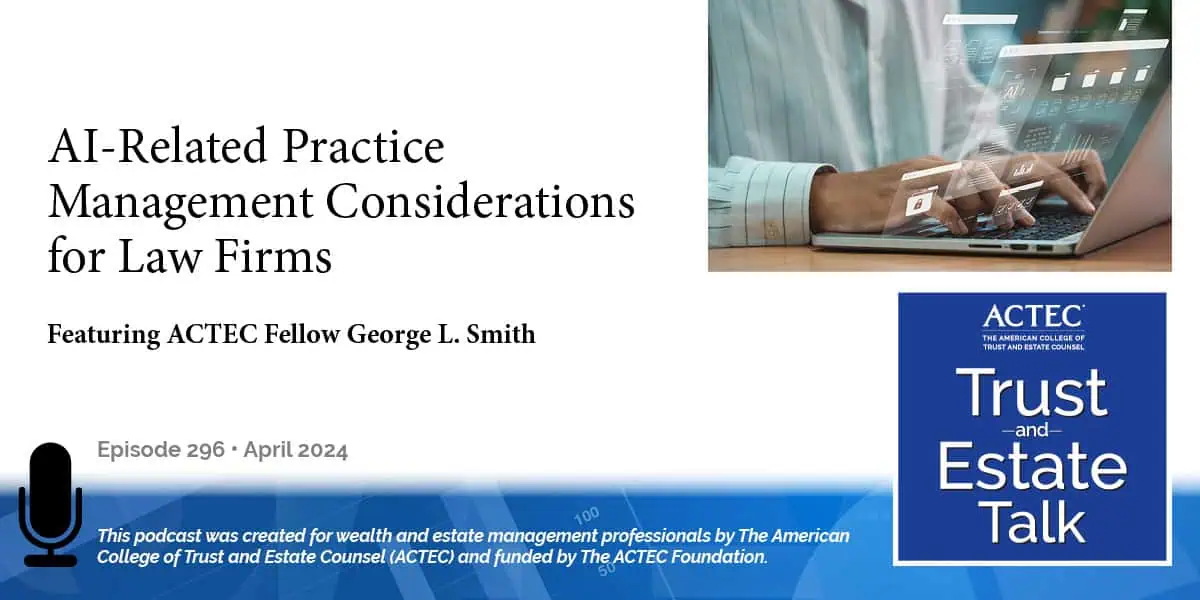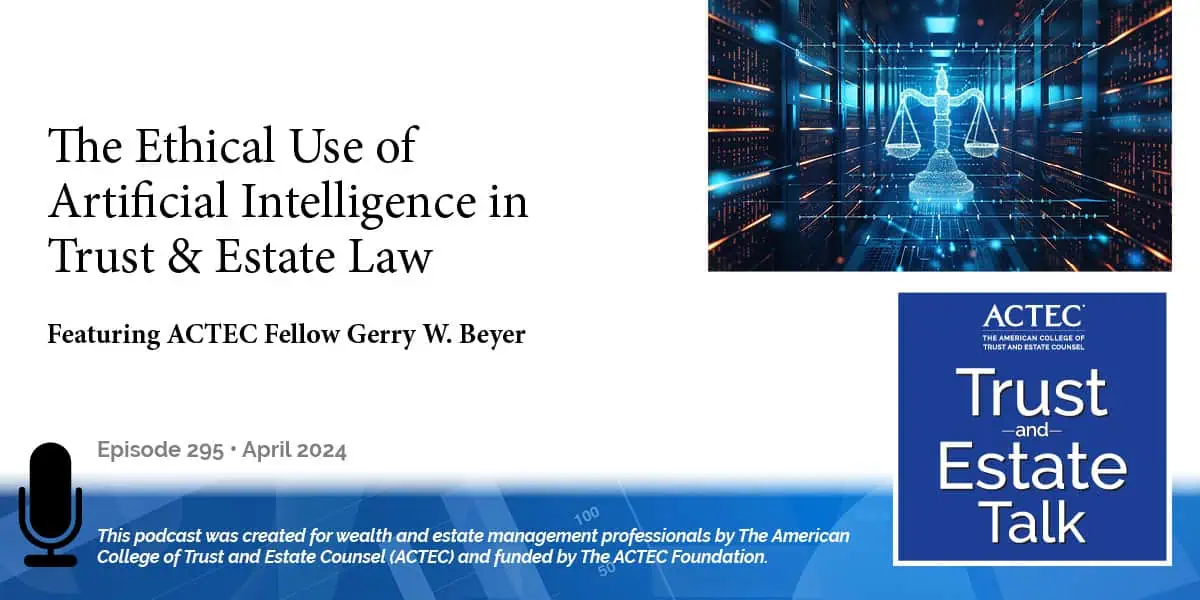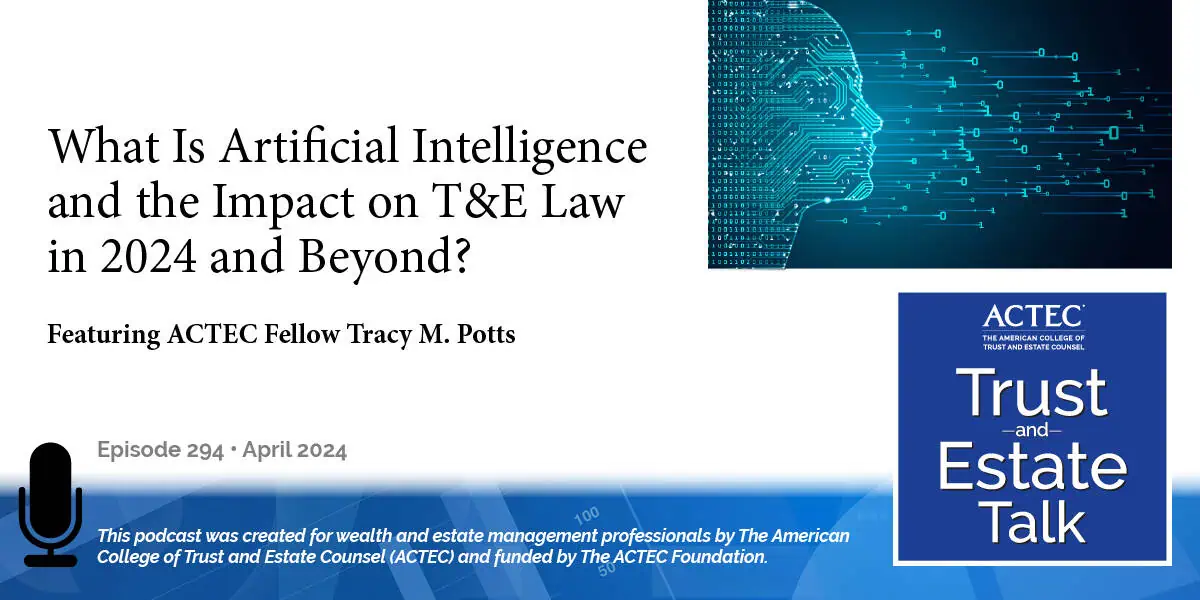Client Restrictions on Charitable Gifts

“Client Restrictions on Charitable Gifts,” that’s the subject of today’s ACTEC Trust and Estate Talk.
Transcript/Show Notes
This is Travis Hayes, ACTEC Fellow from Naples, Florida. Many times we encounter situations where a client is passionate about a certain charity or charitable project, such as the scholarship program at the client’s alma mater. In addressing these types of situations, what should a university or other charity agree to? What should a client insist on? And what steps should be taken to ensure that the client’s goals are met? ACTEC Fellow Turney Berry of Louisville, Kentucky, joins us today to share his thoughts on reasonable restrictions for charitable gifts. Welcome, Turney.
Understanding Client Perspectives and Considerations When Gifting
Turney Berry: Thanks so much, Travis. This is a very commonplace topic, I think. Occasionally, we have very large donors who want to make very large gifts. And we’ll talk about that just a little bit here. But we have lots of donors, at least I do, and I bet you do, who what they want to do is just earmark charitable contributions for things of interest.
For example, I studied a lot of ancient history when I was in college, and if I were going to make a big gift to my college, I would like the college to use it for ancient history as opposed to sociology or engineering. Not that I have anything against engineering or sociology, it’s just not what I was the most excited about. You’ll have similar clients.
What should a client do in that instance? What should you recommend? At the same time, many of us represent charities as well. What should they agree to? What issues should they think about when trying to figure out what sort of charitable restrictions to accept?
Assessing Client Priorities
This is a big topic but let me give you maybe a way to approach the issue. The first one is: how much does the client really care? Most of the time, clients- in my experience- are mostly interested in making a contribution–a gift– to a given institution and they are not as restricted or not as excited about the specifics of the restriction, even though they’re going to talk about that.
So, I might, for example, be very interested in making a contribution to my alma mater, and I would like it to go to the history department. But if, for some reason, it couldn’t do that, why not? I don’t know, maybe Bill Gates has given a billion dollars to benefit the history department. It doesn’t need the money anymore. Well, if that were to happen, I’d still like the money to stay at the alma mater. I would just like it to be used for something else. Those are important questions to tease out minute one in a conversation with your client because it affects everything else.
Reasonable Restrictions on Charitable Gifts
Sometimes that issue can be dealt with, maybe with a time limit. So, for example, what I want to do is offer some sort of particular program that I think is important and that a university might not want to offer. For example, teaching ancient history. I don’t want to endow the teaching of ancient history forever because forever is a very long time. But I can look down the road and say, for the next 25 years, there ought to be somebody whose primary job is to teach the history of the ancient world at my alma mater or at another institution. 25 years is pretty good. I can see 25 years in the future. On a good day, I can remember 25 years in the past; it’s a goodly period of time.
A hundred years – hmm, a hundred years is a long time, five years that’s probably too short. There’s nothing magical there. 35 years works about as well as 25. But you can give your donor some assurance that for the immediate future, here’s what’s going to happen. It’s reasonable to talk to an institution about that. If you’re talking to a healthcare institution and they need certain kinds of equipment, they need certain kinds of rooms, they need certain kinds of personnel; 25 years, 30 years, even though things change fast, that’s a period of time that folks can look down and say, yes, that’s reasonable. Too much further out gets to be more difficult, it seems to me. So, a time limit isn’t a terrible kind of thing.
Sometimes clients, though, will come in and say, I really, really, really do want this money used for “X”. And there you have to say to the client–well, how much extra expense are you willing to go to? If you give the money to the charity with a restriction, you have to put somebody in, who’s in charge of enforcing that restriction. In theory, the state attorney general is in charge of representing the public. But a state attorney general has a lot of issues to deal with, and enforcing your client’s charitable restriction is not very likely to be one of the top issues that the attorney general wants to deal with unless it’s a very large, prominent sort of charitable gift, like the Hershey Trust in Pennsylvania or the School for Youth in Hawaii are prominent examples.
Evaluating Charitable Restrictions
Otherwise, you and the institution, whatever it is, need to agree on who has some ability to enforce. That’s hard to get done, I can say from experience. So, the typical solution is that what you do is you park the money in one institution for the benefit of another. And the first institution’s job is to police the second.
If, for example, I wanted a major educational institution to teach ancient history forever, however long that is, I would put the money at a separate institution, maybe a community foundation, and say make payments every year so long as ancient history is being taught at a level specified, and so on. That typically works pretty well. The issue that you have there is you have a cost. The teaching institution still has the same cost, administrative and otherwise, but the first institution has a cost of holding the funds. If I want to give $100,000, that solution is simply not practical and I need to realize, that that’s just a reality. It’s just the way it is.
Charitable Gifts That an Institution Should Not Accept
The final point I’d want to make here, just in terms of triage, is there are plenty of gifts that an institution shouldn’t accept. My two favorite examples are no university- at least in my judgment- would want to accept a long-term endowment to teach the history of medieval shipbuilding. Too narrow. Too out of the way. Why would a university or other institution want to commit itself to that?
More prosaic is the joke that I have with the choir director, where my wife sings in the choir and where my wife and I go to church. When I get grumpy, I say, “I’m going to endow the singing of Amazing Grace.” No other song, just the singing of Amazing Grace. Well, the church shouldn’t accept that gift because it’ll simply disrupt the operations of the church’s endowment and the choir, as it has to make special arrangements to spend this gift and no other gift. Everything has got to work, and your client needs to understand that if they want to benefit the organization, which presumably they do or they wouldn’t be talking about a charitable gift in the first place. Thank you very much, Travis.
Travis Hayes: Thank you, Turney, for enlightening us on how to address reasonable restrictions on charitable gifts.
Also may also be interested in:
- An Introduction to Charitable Pledges (Oct 2019)
- An Introduction to Individual Donor Advised Funds (DAF) (Oct 2019)
- A Primer on Private Foundations (Oct 2019)
Latest ACTEC Trust and Estate Talk Podcasts

AI-Related Practice Management Considerations for Law Firms
A discussion for law firms about how to incorporate AI in their practice management, including staff considerations, the “billable hour,” and more.

The Ethical Use of Artificial Intelligence in Trust & Estate Law
A law professor offers insights into the risks, rewards, duties and ethical considerations of lawyers using AI in their T&E practices.

What Is Artificial Intelligence and the Impact on T&E Law in 2024 and Beyond?
A primer on the types and uses of AI, then a deeper dive into the impact on trust and estate law from types to applications to ethical considerations.

